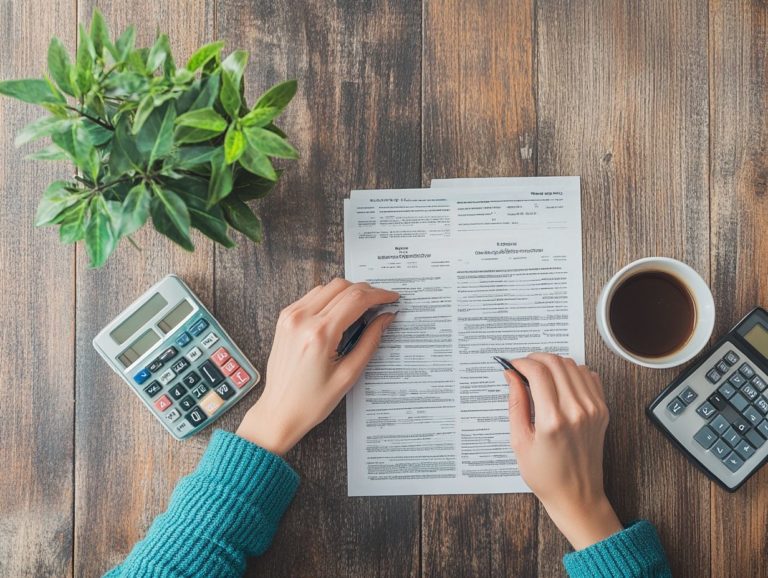How to Get Pre-Approved for a Mortgage
Considering the purchase of a home? Grasping the concept of mortgage pre-approval is an essential initial step that can profoundly influence your home-buying journey.
This guide will illuminate what mortgage pre-approval entails, highlighting its key benefits and outlining the critical steps to secure it. You ll also discover the various factors that can affect your pre-approval status, along with practical tips to boost your chances of success.
By the time you finish, you’ll be ready to tackle the mortgage world with confidence!
Contents
- Key Takeaways:
- Understanding Mortgage Pre-Approval
- Benefits of Getting Pre-Approved
- Steps to Get Pre-Approved
- Factors that Affect Pre-Approval
- Tips for a Successful Pre-Approval
- Frequently Asked Questions
- What is the first step to getting pre-approved for a mortgage?
- What is the difference between pre-qualification and pre-approval?
- How do I choose the right lender for my mortgage pre-approval?
- What factors do lenders consider when determining pre-approval?
- Do I need to have a specific property in mind to get pre-approved for a mortgage?
- What happens after I get pre-approved for a mortgage?
Key Takeaways:

Getting pre-approved for a mortgage is an important step in the home buying process. Understanding the mortgage pre-approval process is crucial, as factors such as credit score, debt-to-income ratio, and employment stability can affect your pre-approval. Gather your documents to boost your chances! Choose a lender and work on improving your credit score and financial stability.
Understanding Mortgage Pre-Approval
Understanding mortgage pre-approval is a crucial step in your home purchase journey, especially for buyers in Washington D.C. who are navigating the complexities of the real estate market.
Securing a preapproval letter from a mortgage lender signifies how much you may qualify to borrow based on your financial history, credit report, and a hard credit check.
This important document simplifies the mortgage application process and offers valuable insights into competitive interest rates and loan amounts, empowering you as you embark on your home buying adventure.
What is Mortgage Pre-Approval?
Mortgage pre-approval is a critical process in which a mortgage lender examines your financial situation and creditworthiness to determine how much you can borrow. This essential step offers you a clearer understanding of your budget when searching for a new home.
Generally, securing a pre-approval letter requires you to gather key documentation, such as income statements, tax returns, and details about your existing debts. Each lender has its own set of criteria for evaluating these factors.
Some may place more emphasis on credit scores, while others might focus on how much of your income goes to paying off debts. It s important to check different mortgage lenders, as their terms and conditions can differ significantly, potentially influencing your final approval and the overall cost of the loan.
Benefits of Getting Pre-Approved
Securing pre-approval for a mortgage brings a wealth of advantages that can greatly elevate your home-buying journey in Washington D.C. It equips you with a clear understanding of your budget, streamlines the entire process, and boosts your negotiating power.
With a mortgage preapproval in hand, you gain access to competitive interest rates while clearly defining your down payment options. This makes it much easier to sift through suitable real estate listings on platforms like Zillow and Redfin.
Presenting a preapproval letter to sellers conveys your seriousness as a buyer, often placing you in a more advantageous position during negotiations.
Why Pre-Approval is Important for Homebuyers
Pre-approval is essential for you as a homebuyer. It offers a clear picture of your borrowing capacity while also giving you a competitive edge in the housing market. This financial readiness can greatly streamline your home buying journey, reducing uncertainty and clarifying how much you can confidently spend.
When you obtain pre-approval, you’ll expedite your purchasing timeline, allowing you to make offers on properties more swiftly. Without this preparation, unexpected financial surprises could derail your plans and lead to missed opportunities.
Competitive interest rates enhance your affordability, making homes more accessible, especially in a fluctuating market where quick decisions are often necessary. By getting pre-approved, you not only position yourself favorably but also protect yourself against unforeseen challenges.
Steps to Get Pre-Approved

The journey to mortgage pre-approval is a process you need to follow carefully. It begins with gathering essential documents think proof of income, financial history, and a credit report.
These will be looked at closely by lenders to assess your eligibility. By taking the time to choose your lender wisely, you can sift through the multitude of options available and secure terms that align with your financial landscape.
Gathering Necessary Documents
Gathering the necessary documents is an essential first step in your mortgage application journey. It enables lenders to effectively assess your financial history and creditworthiness.
This preparation not only streamlines the pre-approval process but also sets clear expectations for you as a potential borrower.
Essential documents typically include:
- Recent pay stubs
- Tax returns from the last two years
- Current bank statements
These documents provide a thorough picture of your financial situation. They correlate closely with the hard credit check, serving as supporting evidence that complements your credit score when lenders evaluate your overall financial stability.
By supplying these documents, you can demonstrate your ability to repay the loan, significantly enhancing your chances of securing favorable mortgage terms.
Choosing a Lender
Finding the perfect mortgage lender is an exciting step! Different lenders present a range of rates, terms, and customer service experiences that can shape your mortgage adventure.
It’s essential to evaluate potential lenders meticulously. Consider their interest rates, associated fees, and market reputation. Start by researching various lenders online, comparing their offerings, and diving into customer reviews.
Transparency in their fee structures is key; hidden costs can easily throw your financial plans off track. When you engage with these lenders, don t shy away from asking important questions about their loan products, turnaround times, and the support they offer throughout the borrowing process.
Prioritizing lenders that align with your specific financial goals will pave a smoother path to homeownership.
Completing the Application Process
Completing the mortgage application process marks the crucial final step to obtaining your pre-approval letter, giving you the power to advance with confidence in your home-buying journey.
Throughout this process, you’ll need to fill out several forms that detail your financial background, income, and credit history. Communication with your lenders is key; expect them to follow up with requests for additional documentation, which may include pay stubs, tax returns, and bank statements.
The entire process can take anywhere from a few days to a couple of weeks, depending on the lender s workload and how complete your application is. By staying proactive in your responses to inquiries, you can significantly speed up this timeline.
This gives you the reassurance you need to delve into the housing market with clarity and assurance.
Factors that Affect Pre-Approval
Several key factors can profoundly influence your mortgage pre-approval, such as your credit score, the amount of money you owe compared to how much you earn, and employment stability.
Lenders scrutinize these elements to assess your eligibility and the terms of your mortgage. It’s crucial for you, as a prospective buyer in Washington D.C., to have a clear understanding of your financial health before diving into the pre-approval process.
A robust credit score usually opens the door to competitive interest rates, while a favorable debt-to-income ratio significantly boosts your chances of approval. These aspects are vital in the mortgage pre-approval equation.
Start gathering your documents today to take control of your home-buying journey!
Credit Score and Debt-to-Income Ratio

A home buyer’s credit score and debt-to-income ratio are essential metrics that mortgage lenders scrutinize during the preapproval process. They assess your ability to manage money well and your borrowing capacity.
Understanding how credit scores are calculated can significantly influence your readiness and options as a buyer. Scores typically range from 300 to 850, and most lenders favor a score above 620 for conventional loans.
If you’re considering an FHA loan, aim for a score of at least 580. A strong credit score reflects your ability to make timely payments and maintain a healthy mix of credit types.
It s crucial to keep your credit utilization low and have a debt-to-income ratio ideally below 36%. You can improve these metrics by consistently making on-time payments, reducing existing debt, and avoiding large purchases before applying for a mortgage.
By doing so, you enhance your chances of securing favorable loan terms.
Employment and Income Stability
Employment and income stability are crucial components of the mortgage preapproval process. Lenders seek assurance that you have a reliable income source to repay your loans.
A solid employment record along with a consistent income stream can significantly enhance your chances of securing favorable mortgage terms. Typically, lenders prefer to see at least two years of steady employment, ideally within the same industry.
This serves as proof of your job security and commitment. A stable job often indicates full-time employment with consistent hours.
Observable growth or salary increases over time can further bolster your appeal to lenders. Compile a thorough employment history, including pay stubs, tax returns, and any promotion letters.
Each of these documents serves as indicators of your financial reliability. Presenting your income in an organized manner, possibly with a cover letter explaining any unique circumstances, can strengthen your application.
Tips for a Successful Pre-Approval
Securing a successful mortgage pre-approval demands strategic planning and proactive measures! Home buyers eager to enhance their financial profile must streamline the home buying process.
By prioritizing improvements to your credit score and reducing existing debt, you can significantly boost your chances of securing favorable terms from mortgage lenders. Meticulously prepare essential documentation for added impact.
Gaining a solid understanding of the mortgage pre-approval process and knowing the right steps can dramatically change your path to homeownership act now!
Improving Your Credit Score
Improving your credit score can be a game changer! It’s one of the best steps you can take to enhance your chances of securing mortgage preapproval and accessing those competitive interest rates you deserve.
Making timely bill payments is essential; late payments can leave a significant mark on your score. Reducing credit card balances is equally vital to showcase your responsible credit management skills.
Regularly checking your credit reports from major agencies like Equifax, Experian, and TransUnion is a smart move. This allows you to spot errors and address discrepancies before they escalate.
As your credit score improves, you ll find yourself eligible for better mortgage options, ultimately saving you money in the long run.
Reducing Debt and Increasing Income
Reducing debt and increasing your income are essential strategies for home buyers looking to improve their debt-to-income ratio. This ratio is an important factor in the mortgage preapproval evaluation process.
By diligently adopting effective methods, you can enhance your financial stability and present yourself as a more attractive candidate to lenders. Creating a budget gives you a clear snapshot of your monthly expenses.
This helps you spot unnecessary costs that could be trimmed. Prioritize repaying high-interest loans to yield significant savings over time.
To boost your income, explore additional employment opportunities, consider freelancing, or negotiate a salary increase with your current employer. These proactive steps alleviate financial stress and set the stage for a smoother mortgage approval experience.
Preparing for the Home Buying Process

Preparing for the home buying process involves more than just securing a mortgage preapproval. It requires a good understanding of the real estate market and careful planning.
Your preparation journey typically starts with thorough research on real estate listings. This helps you pinpoint areas that align with your personal needs and budget.
Collaborating with a qualified real estate agent can provide you with invaluable insights into market trends and property values. This makes your search significantly more efficient.
Once you secure that preapproval letter, it clarifies how much you can afford. It also strengthens your position during negotiations, making sellers more likely to take your offers seriously.
Understanding these steps can profoundly enhance your home buying experience. This ensures a smoother transition into your new chapter.
Frequently Asked Questions
What is the first step to getting pre-approved for a mortgage?
The first step to getting pre-approved for a mortgage is to gather all necessary financial documents, such as pay stubs, tax returns, and bank statements.
What is the difference between pre-qualification and pre-approval?
Pre-qualification is an estimate of how much you may be able to borrow based on your financial information. In contrast, pre-approval is a more formal process that involves a thorough review of your finances and credit history.
How do I choose the right lender for my mortgage pre-approval?
When choosing a lender for your mortgage pre-approval, it is important to compare interest rates, fees, and customer reviews. You should also consider the level of customer service and communication offered by the lender.
What factors do lenders consider when determining pre-approval?
Lenders consider factors such as your credit score, income, employment history, and debt-to-income ratio when determining your pre-approval amount. They will also assess the property value you are interested in purchasing.
Do I need to have a specific property in mind to get pre-approved for a mortgage?
No, you do not need to have a specific property in mind to get pre-approved for a mortgage. However, having an idea of the type of property you are interested in and its estimated cost can help the lender provide a more accurate pre-approval amount.
What happens after I get pre-approved for a mortgage?
After you get pre-approved for a mortgage, you can begin your home search with confidence, knowing how much you can afford. Before diving into this process, it’s helpful to understand how to prepare for a mortgage application. Once you find a property, you can move forward with the full mortgage application process.






